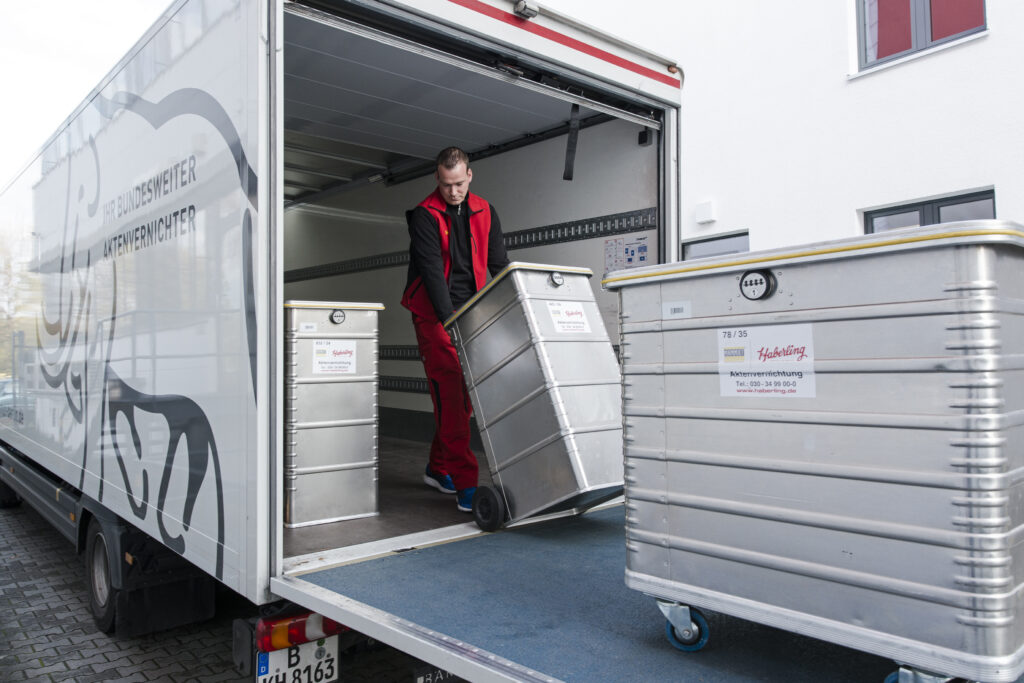Sustainable Document Destruction
As a long-standing and forward-thinking company, adapting to our environment is a key priority for us. That’s why we offer you the opportunity to have your sensitive data destroyed in a sustainable and environmentally friendly manner.
In general, the proper disposal of documents is an essential responsibility for any business. You are legally required to dispose of confidential and personal data in accordance with the applicable regulations. Under the GDPR, such data must be securely destroyed once the legally mandated retention period has expired — simply throwing it away is not permitted. Any violation can have legal consequences.
Starting in 2024, companies will also be required to produce annual sustainability reports. Our sustainable document destruction service can help your business meet this obligation while also making a clear statement about your commitment to sustainability.
Let us advise you and provide further information. We are happy to support you in advancing sustainability in your business and reducing your environmental impact.
Your Sustainable Document Destruction with Haberling
- Secure – because we are DIN-certified
- Affordable – because it requires virtually no effort on your part
- Fast – because our company is located in the heart of Berlin
Your Data Is Safe with Us – We Are DIN-Certified

We provide reliable services for the secure destruction of data. As a certified waste management company, we are audited in accordance with DIN 66399 and offer sustainable, secure destruction of both documents and data carriers in compliance with the highest security standards.
Your documents and data carriers are protected from unauthorized access at all times and are monitored from the pickup point to our facility. They are transported in locked security containers, which are only opened within an access-controlled, video-monitored area of our premises. There, the contents are destroyed using our state-of-the-art destruction system in accordance with DIN 66399, up to protection class 3.
How Can Document Destruction Be Sustainable?
Sustainable document destruction means carrying out the process in an environmentally friendly way. To ensure this, we work with our partner MAMMUT Deutschland to maintain a closed recycling loop and avoid unnecessary environmental costs.
Instead of producing single-use tissue paper from the remains of your securely destroyed documents, our sustainable document destruction process repurposes the shredded material for the production of recycled office paper. We use high-quality Steinbeis paper, which is known for its environmentally friendly and low-emission manufacturing process. This paper can be reused again and again through our sustainable destruction process, creating a continuous materials cycle. In this way, fresh fibers and other raw materials can be saved in the long term.
Benefits of Sustainable Document Destruction
Take advantage of our environmentally friendly document destruction service and benefit from the savings potential compared to traditional paper production using virgin fibers. The following resources can be saved:
- 100% less wood
- 83% less water
- 72% less energy
- 53% fewer CO₂ emissions
Source: Steinbeis Papier GmbH
Based on 100 new file folders, the use of eco-friendly and simultaneously new recycled office paper results in the following savings:
- 537 kg of wood
- 9,999 liters of water
- 2,374 kWh of energy
- 103 kg of CO₂
Source: ifeu – Institute for Energy and Environmental Research Heidelberg gGmbH
Sustainability Documentation for Corporate Document Destruction from 2024 Onward

For many companies, sustainable action and contributing to their own environmental footprint are nothing new. Many already prepare sustainability reports to track and document their environmental impact. Switching from conventional document destruction to a sustainable alternative offers a valuable opportunity to further enhance your next sustainability assessment.
Starting in 2024, such reports will become mandatory for companies. By choosing sustainable document destruction, you can also receive a detailed sustainability certificate. This certificate includes information on energy savings and can serve as an additional positive element in your next sustainability report.
FAQ – Frequently asked questions
What Is DIN 66399?
DIN 66399 defines the standard for the destruction of documents and data carriers, as well as the disposal of shredded material.
Under this standard, different types of data carriers are assigned to specific protection classes and security levels based on the sensitivity of the information they contain.
- Protection Class 1: Normal protection requirements (e.g., general business correspondence)
- Protection Class 2: High protection requirements (e.g., personnel records)
- Protection Class 3: Very high protection requirements (e.g., intelligence or classified documents)
In addition, there are seven security levels that define the degree of shredding required. Since only you know the content of your documents, the responsibility for correct classification lies with you. You decide how small the particles must be shredded to ensure proper data protection. Of course, we are happy to advise you on this.
What Are Personal Data?
Personal data refers to any information that can be used to identify a natural person. This includes details such as addresses, email addresses, phone numbers, dates of birth, bank account information, license plate numbers, IP addresses, location data, and browser cookies. For institutions and businesses, it's important to note that the definition of personal data is interpreted very broadly. If you're unsure whether certain documents contain personal information, we recommend assuming that they do. When it comes to document destruction, this means it’s better to opt for a higher security level to ensure proper protection.
How We Make Document Destruction Environmentally Friendly
- Our solar power system allows us to save approximately 13 tons of CO₂ per year — the equivalent of planting around 40 trees.
- We rely on electric mobility.
- We process destroyed materials in accordance with the Circular Economy Act for recycling purposes.
